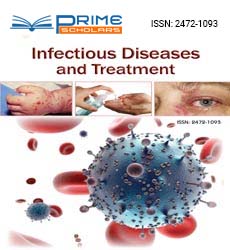Commentary Article - (2023) Volume 9, Issue 6
COVID-19: An Unprecedented Global Challenge and the Path Forward
Jing Ye*
Department of Pathology, University of London, UK
*Correspondence:
Jing Ye,
Department of Pathology, University of London,
UK,
Email:
Received: 03-May-2023, Manuscript No. IPJIDT-23-17034;
Editor assigned: 02-Jun-2023, Pre QC No. IPJIDT-23-17034 (PQ);
Reviewed: 16-Jun-2023, QC No. IPJIDT-23-17034;
Revised: 21-Jun-2023, Manuscript No. IPJIDT-23-17034 (R);
Published:
28-Jun-2023, DOI: 10.36648/2472-1093-9.6.51
Description
The world has been grappling with the profound impact of the
COVID-19 pandemic for over 2 years. From its emergence in
late 2019, the novel Coronavirus has spread rapidly across continents,
challenging healthcare systems, economies, and societies
worldwide. This article aims to provide a comprehensive
overview of the pandemic, its consequences, and the progress
made so far in combating the virus. COVID-19, caused by
the severe acute respiratory syndrome Ccoronavirus 2 (SARSCoV-
2), first emerged in the city of Wuhan, China. With its high
transmissibility, the virus swiftly spread across borders, triggering
a global health crisis. The impact of the pandemic has been
multi-faceted, encompassing significant loss of life, severe
strain on healthcare infrastructure, economic disruptions, and
widespread social upheaval.
The pandemic exposed vulnerabilities in healthcare systems
worldwide, with hospitals and medical professionals overwhelmed
by the influx of patients. However, the crisis also
spurred remarkable scientific advancements. Within a year,
multiple vaccines were developed, tested, and authorized for
emergency use, offering hope in the fight against COVID-19.
Vaccination campaigns have played a crucial role in reducing
severe illness, hospitalizations, and deaths, and have paved the
way for a gradual return to normalcy.
The socioeconomic consequences of the pandemic have been
profound and far-reaching. Industries such as travel, hospitality,
and retail faced severe disruptions, leading to job losses and
economic instability. Remote work became the norm, transforming
the way people live and work. Educational institutions
had to adapt rapidly to online learning, while the mental health
toll on individuals and communities became a significant concern.
COVID-19 prompted unprecedented global collaboration
among scientists, healthcare professionals, and policymakers.
Organizations such as the World Health Organization (WHO)
played a central role in coordinating efforts, sharing knowledge,
and facilitating equitable vaccine distribution. The pandemic
underscored the need for robust healthcare systems, investment in research, and improved international cooperation
to address future health crises effectively. Despite progress
in vaccination efforts, the emergence of new variants has
posed ongoing challenges. Variants such as the Delta variant
have shown increased transmissibility, emphasizing the need
for continued vigilance. Sustained public health measures, including
mask-wearing, testing, contact tracing, and vaccination
campaigns, remain crucial in preventing the spread of the virus
and curbing future outbreaks.
One critical issue that has come to the forefront is the need for
equitable vaccine distribution globally. While some countries
have achieved high vaccination rates, others continue to face
limited access to vaccines. Ensuring fair and affordable distribution
is essential to combatting the pandemic effectively, as
no one is safe until everyone is safe. As the world strives to
recover from the pandemic, a multi-pronged approach is necessary.
This includes ramping up vaccination efforts, improving
testing and surveillance systems, investing in healthcare
infrastructure, and strengthening global preparedness and response
mechanisms. Ongoing research and development will
be vital to tackle new variants, develop booster shots, and enhance
treatment options.
The COVID-19 pandemic has left an indelible mark on the
world, highlighting the importance of global cooperation, scientific
innovation, and resilient healthcare systems. While
progress has been made, the fight against the virus is not over.
By prioritizing equitable vaccine distribution, maintaining public
health measures, and fostering international collaboration,
we can navigate the path forward and emerge stronger, more
prepared, and united in the face of future challenges.
Acknowledgement
None.
Conflict Of Interest
The author declares there is no conflict of interest in publishing
this article.
Citation: Ye J (2023) COVID-19: An Unprecedented Global Challenge and the Path Forward. J Infect Dis Treat. 9:51.
Copyright: © 2023 Ye J. This is an open-access article distributed under the terms of the Creative Commons Attribution License,
which permits unrestricted use, distribution, and reproduction in any medium, provided the original author and source are
credited
